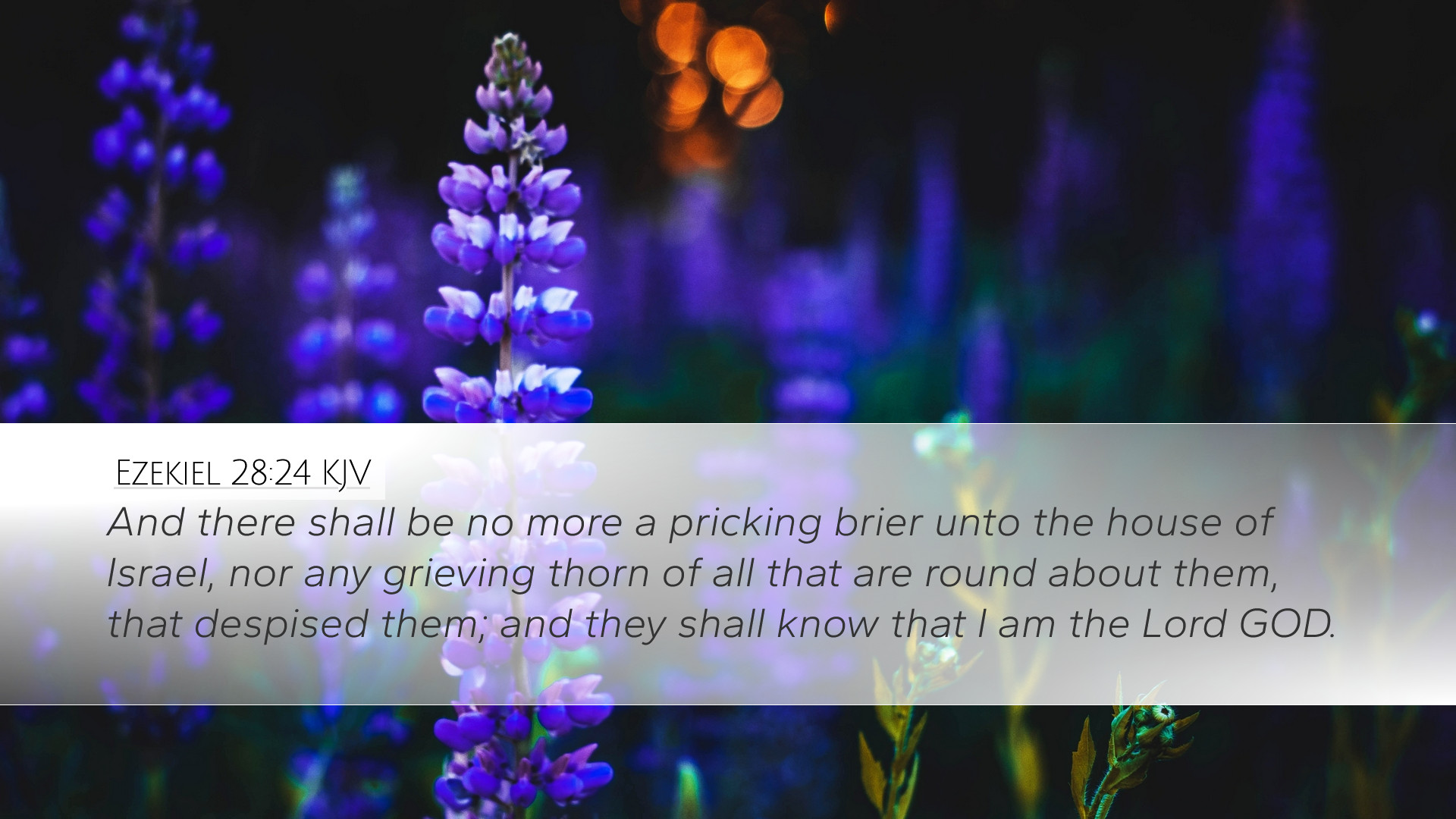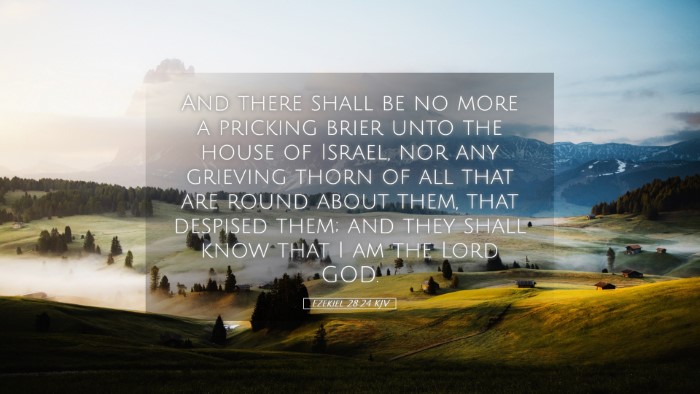Ezekiel 28:24 - Commentary of Public Domain Insights
Ezekiel 28:24 states: "And there shall be no more a pricking brier unto the house of Israel, nor any grieving thorn of all that are round about them, that despised them; and they shall know that I am the Lord GOD." This verse is part of a larger discourse concerning the judgment of Tyre and its king, embodying a promise of restoration and the removal of distressing influences upon Israel. The implications of this verse stretch into theological, practical, and prophetic realms.
Contextual Overview
The Book of Ezekiel encompasses visions, prophecies, and symbols centered around Israel's restoration amidst exile. Specifically, the surrounding nations are addressed, and their roles in Israel's suffering are examined. Ezekiel 28 deals with the pride and downfall of the king of Tyre, representing broader themes of arrogance and divine judgment.
Commentary Insights
Matthew Henry's Analysis
Matthew Henry emphasizes the significance of "no more a pricking brier," illustrating that God’s intervention will remove sources of pain and suffering for His people. This metaphor highlights the enduring struggle of Israel against its oppressors and the relief that comes through divine intervention.
Divine Judgment and Restoration
- Judgment upon Adversaries: Henry points out that this promise follows a series of judgments against nations who have caused Israel grief, suggesting that God will not only bring restoration but also execute justice for their wrongs.
- Comprehensive Healing: The removal of "pricking brier" symbolizes a comprehensive healing process. It indicates that not only will oppression cease, but Israel will also experience rejuvenation.
Albert Barnes' Insights
Albert Barnes offers an understanding of the phrase "pricking brier" as a prophetic assurance. He interprets it as a declaration that the former oppressors of Israel will be completely removed, signifying God’s control over history. The "grieving thorn" symbolizes those persistent troubles that constantly afflict God's people.
Promise of Peace
- Absence of Grievous Entities: Barnes elaborates that this divine promise points to a significant period in which Israel will enjoy peace characterized by the absence of those who previously brought sorrow.
- Recognition of God’s Sovereignty: The conclusion that "they shall know that I am the Lord GOD" indicates a coming recognition among the nations and Israel itself of God's sovereignty. This theme of knowledge is repeated throughout Ezekiel, underscoring both the relational knowledge and acknowledgment of God's power.
Adam Clarke's Commentary
Adam Clarke interprets this verse as an assurance to Israel, that God will inhibit their former enemies and provide a safer environment for them. Clarke's analysis frames this passage within the context of eschatological hope, where the present struggles of Israel will one day give way to divine comfort and peace.
Theological Implications
- God’s Covenant Identity: Clarke posits that this verse reaffirms the covenant relationship God has with Israel. Their identity as God’s chosen people guarantees their ultimate victory over adversity.
- Historical Reflection: Clarke encourages readers to reflect historically on God's promises and interventions as a basis for faith in His future actions. The historical context of Israel’s suffering is crucial in understanding the weight of this promise.
Application for Modern Readers
For pastors, students, theologians, and Bible scholars, Ezekiel 28:24 offers profound insight into the nature of God's justice, the character of His promises, and the hope of restoration. The promises made in this passage are not merely historical; they resonate in various applications today:
- Comfort in Trials: Just as Israel was promised relief from suffering, modern believers can find comfort in knowing that God is aware of their struggles and will ultimately provide relief.
- Call to Holiness: The passage suggests that recognition of God's sovereignty should lead to a lifestyle of holiness and dependence on Him.
- Implications for Leadership: For church leaders, the text speaks to the responsibility of guiding with humility and awareness of God’s judgment against pride.
Conclusion
In Ezekiel 28:24, the removal of "pricking briers" and "grieving thorns" symbolizes a significant moment in God's redemptive plan. Through the insights provided by Matthew Henry, Albert Barnes, and Adam Clarke, readers may better understand the implications of divine judgment and restoration. Ultimately, the promise encapsulates a future where God’s people are free from their oppressors and walk in the fullness of His presence. The theological and practical applications for today's believers underscore a powerful testament to God's enduring faithfulness and sovereignty.


